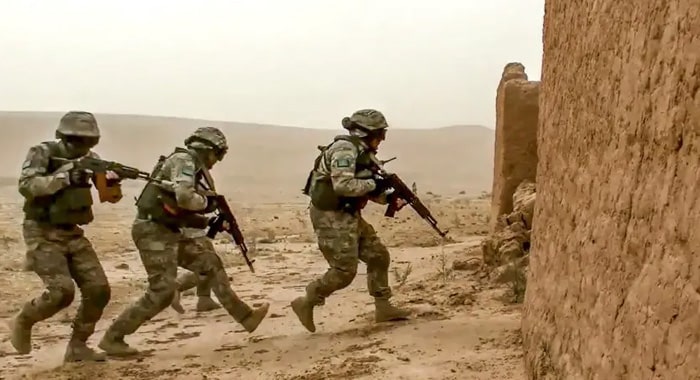In a bid to confront growing regional insecurity, the Collective Security Treaty Organization (CSTO) has announced plans to begin the delivery of weapons and military equipment to the Afghanistan border, aiming to contain threats emanating from Afghan territory and bolster collective defense capabilities.
CSTO Secretary-General Imangali Tasmagambetov confirmed during a session of the CSTO Parliamentary Assembly that the shipments will soon be dispatched to Tajikistan, which shares a vulnerable 1,400-kilometre frontier with Afghanistan. The initiative marks the formal implementation of a 2024 agreement reached in Astana, Kazakhstan, and will unfold in three strategic phases beginning in 2026.
The program comes in response to heightened concerns over the deteriorating security landscape in Afghanistan, where more than 20 active terrorist groups—including ISIS and Tehrik-i-Taliban Pakistan—are believed to operate with impunity. Despite repeated assurances from the Taliban regime that Afghan soil is not being used for foreign militant activities, intelligence reports and regional assessments suggest otherwise, pointing to an alarming rise in extremism and cross-border infiltration.
Tajikistan has long sounded the alarm over incursions by radical elements, and CSTO member states—including Russia, Kazakhstan, Kyrgyzstan, Armenia, and Belarus—have rallied to construct what experts describe as a “security belt” around Afghanistan. This defensive framework, championed by Tajik President Emomali Rahmon, seeks to neutralize the cross-border influence of terrorist and criminal networks that have flourished since the Taliban’s return to power in 2021.
The plan includes fortifying military infrastructure in southern Tajikistan and enhancing the CSTO’s rapid response capabilities, with joint military exercises already conducted to improve operational coordination. The flow of narcotics and weapons from Afghanistan has also surged, further destabilizing neighboring countries and fuelling transnational crime.
“The CSTO cannot ignore the persistent and growing threats from Afghanistan,” said a senior security analyst. “Without decisive regional action, these dangers will only deepen.”
As the international community continues to grapple with the consequences of the Taliban’s unchecked rule, the CSTO’s border initiative underscores a widening trust gap and a recognition that regional actors must now take the lead in protecting their own frontiers from Afghanistan’s escalating instability.





